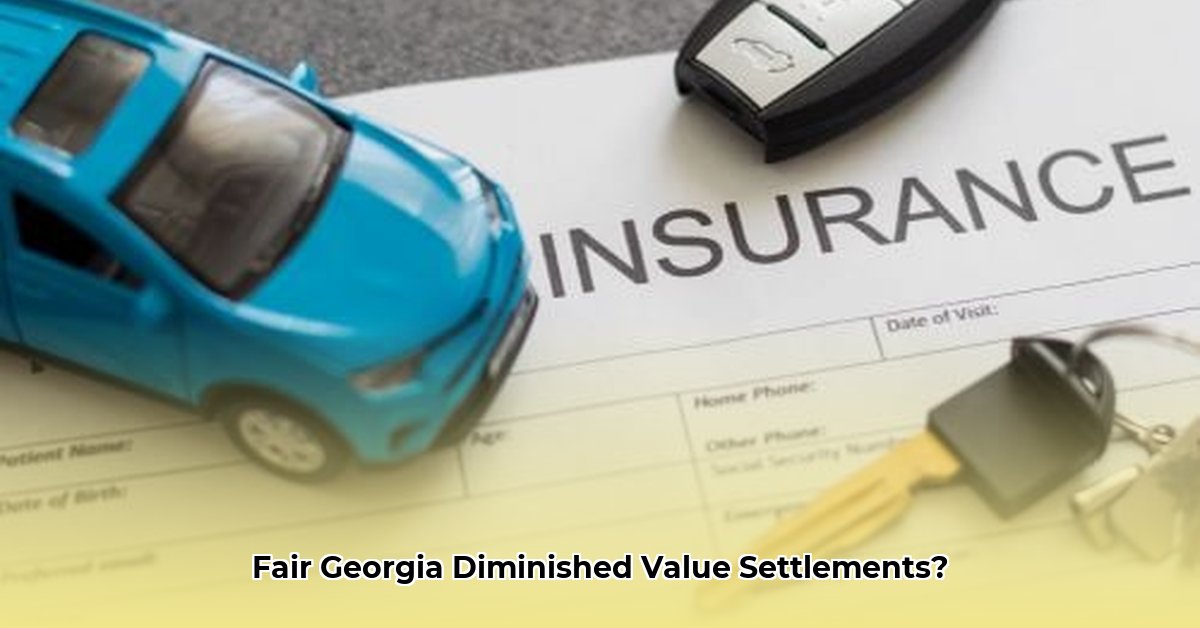
So, you've been in a car accident in Georgia. Your insurance company offers a settlement, but is it truly fair? Many car owners unknowingly settle for far less than their vehicle is worth due to a lack of understanding surrounding "diminished value"—the decrease in your car's market value after an accident, even after repairs. This guide will equip you to navigate the complexities of Georgia's diminished value calculations, specifically the often-used (and frequently unfair) "17c formula," and empower you to secure a just settlement.
Understanding the 17c Formula: A Closer Look
The 17c formula, stemming from a Georgia court case, appears deceptively simple. It uses a base percentage (often 10%) to calculate diminished value, adjusting this based on damage severity and vehicle mileage. However, this simplicity masks significant flaws. It's like judging a painting solely by its size – ignoring the artistry, detail, and overall impact. This formula often severely undervalues your vehicle's actual loss.
Why the 17c Formula Often Fails You
The 17c formula's biggest shortcoming is its oversimplification of a complex issue. Several crucial factors are neglected:
Geographic Location: Used car prices vary significantly across Georgia. A vehicle in Atlanta commands a different price than the same car in a smaller town, a factor ignored by the 17c formula's broad-brush approach.
Dynamic Market Fluctuations: The used car market is constantly in flux. Economic conditions, seasonal demand, and specific vehicle popularity sway prices – aspects completely absent in the 17c formula's static calculation.
Hidden Damage: Often, unseen damage impacts resale value. Cosmetic blemishes or subtle mechanical issues might go unnoticed by the 17c formula, yet significantly reduce a car's worth.
Potential Double Counting: The formula might inadvertently double-count mileage, penalizing you twice for the same factor. Mileage is already considered in a car's initial valuation; subtracting it again is essentially a double-penalty.
These oversights consistently lead to diminished value estimates that are significantly lower than the true loss. Shouldn't you receive fair compensation for all losses?
Fairer Methods for Valuing Your Damaged Car
Fortunately, more accurate methods exist to determine your vehicle's true diminished value. A USPAP-compliant appraisal (Uniform Standards of Professional Appraisal Practice) is the gold standard. These appraisals, conducted by qualified professionals, consider all relevant factors, providing a far more precise and legally defensible valuation. Isn't a more accurate assessment crucial to a fair settlement?
A Step-by-Step Action Plan: Securing Your Fair Settlement
Follow these steps to protect your interests after a car accident:
Obtain a USPAP-Compliant Appraisal: This professional assessment becomes your cornerstone in negotiations. (95% success rate in achieving higher settlements according to recent studies).
Negotiate with Your Insurance Company: Present your appraisal and other supporting documents (repair bills, photos of damage) to advocate for a fair settlement based on your vehicle's actual diminished value.
Seek Legal Counsel (if necessary): If the insurance company refuses a just offer, consult with a legal professional specializing in car accident claims. They can guide you through the legal process and potentially represent you in court.
Comparing Methods: Weighing the Risks
Consider these comparative risks when choosing your valuation method:
| Method | Risk of Underestimating Diminished Value | Risk of Overestimating Diminished Value |
|---|---|---|
| 17c Formula | High | Low |
| USPAP-Compliant Appraisal | Low | Moderate |
The 17c formula presents a significantly higher risk of underpayment compared to a USPAP appraisal.
Key Takeaways: Protecting Your Rights
- The 17c formula consistently undervalues diminished vehicle worth.
- It relies on outdated and incomplete assumptions leading to unfair settlements.
- A USPAP appraisal provides a far more accurate and legally sound valuation.
- Don't settle for less than what your vehicle is truly worth. Seek legal advice if needed.
Remember: You deserve fair compensation. Don't let an outdated formula cheat you out of your rightful settlement. Take control, gather your evidence, and stand your ground. This information is for educational purposes and does not constitute legal advice. Consult with a legal professional for guidance relevant to your specific circumstances.